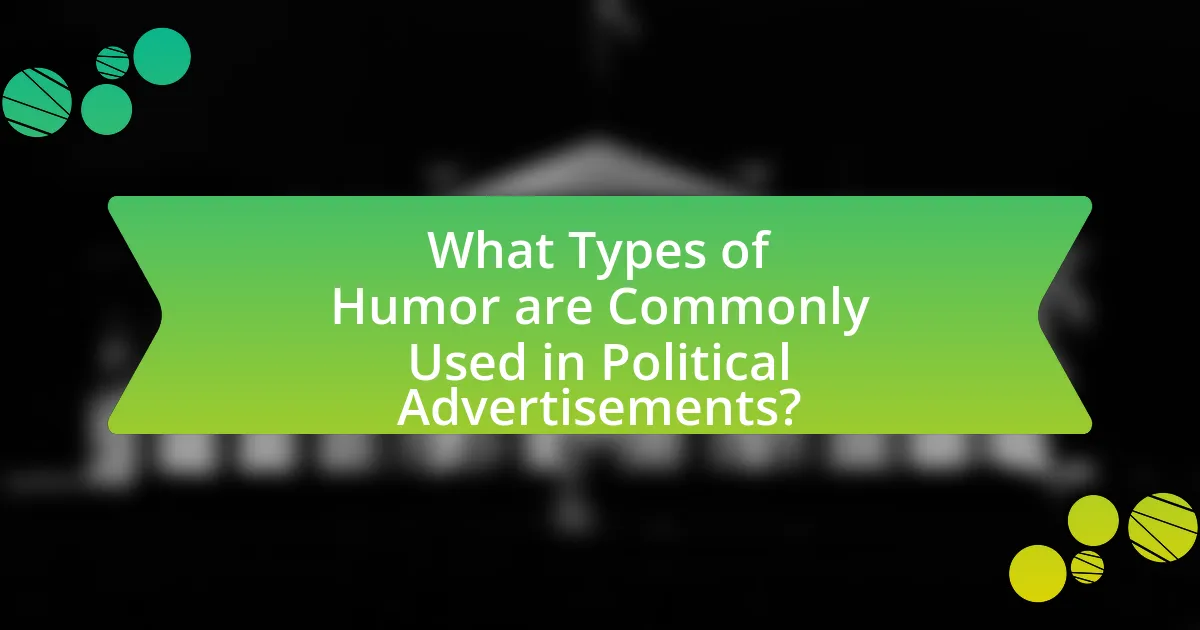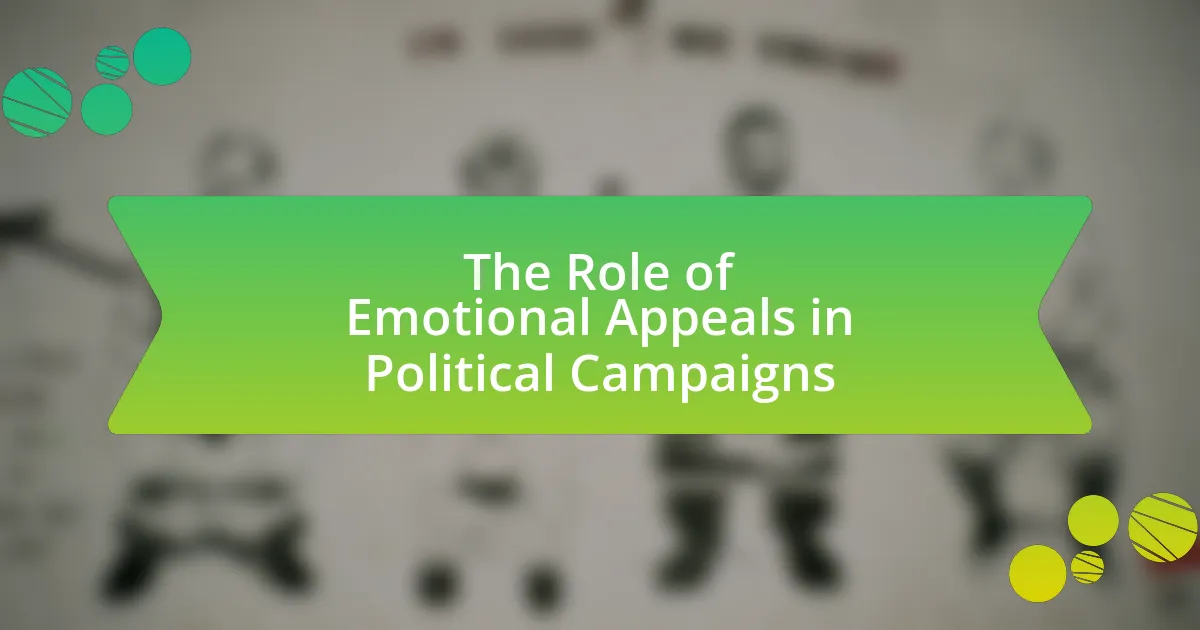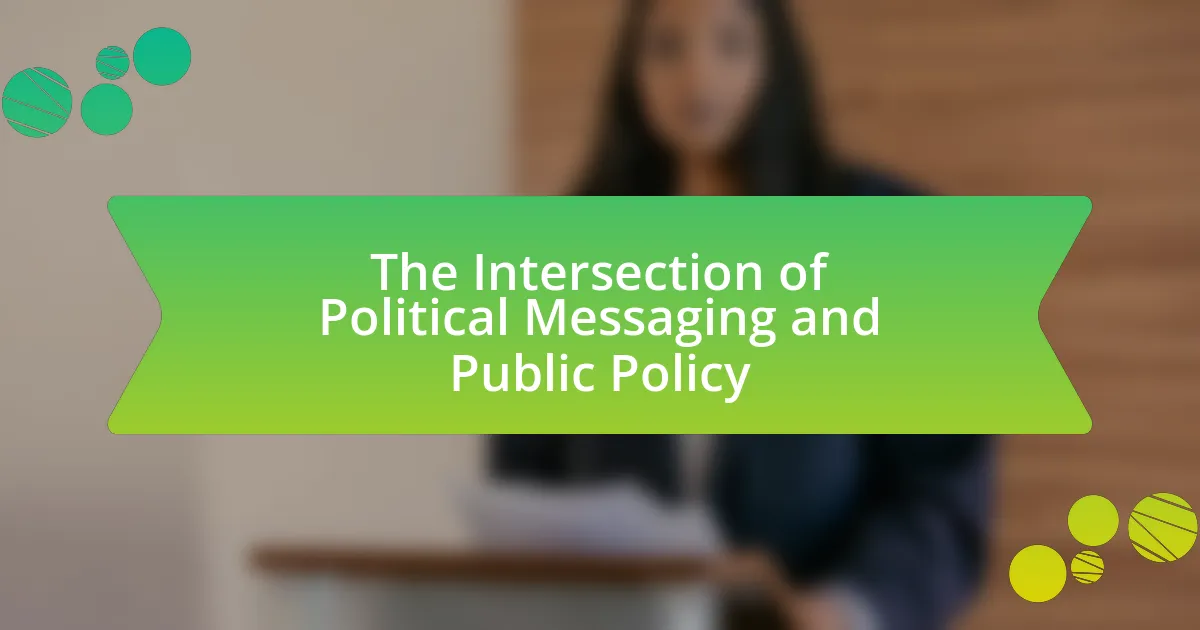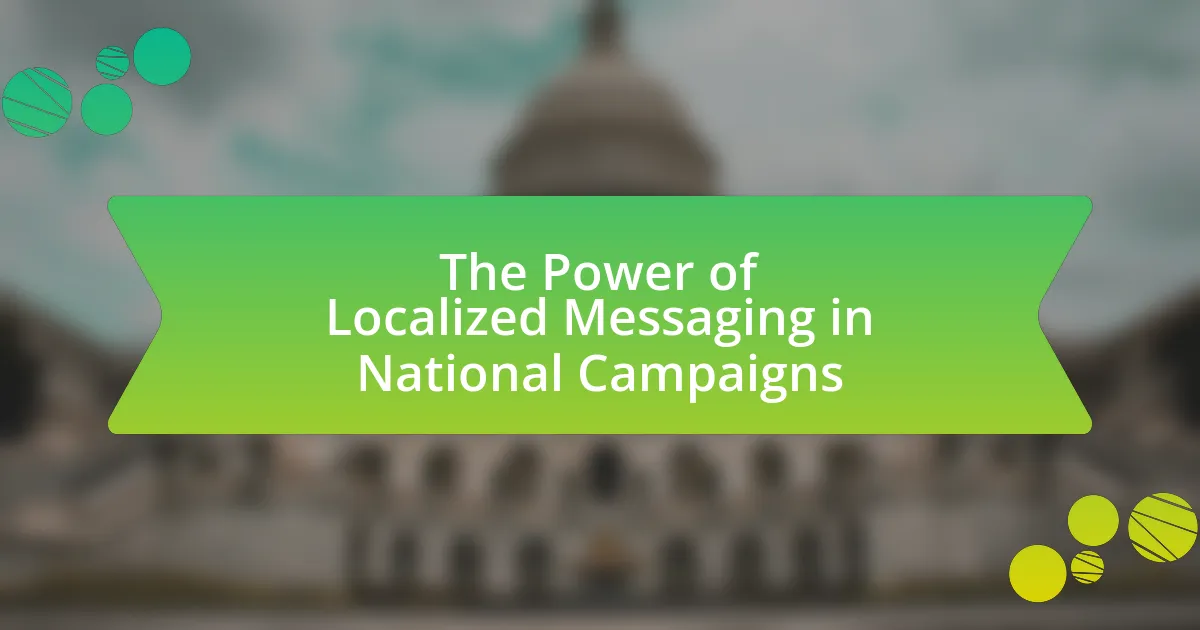The article examines the role of humor in political advertisements, highlighting its effectiveness in engaging audiences, enhancing message retention, and shaping voter perceptions. It discusses how humor can humanize candidates, making them more relatable and likable, while also addressing the psychological effects of humor on audiences. The article explores various types of humor used in political ads, such as satire and parody, and analyzes the potential risks and backlash candidates may face when employing humor. Additionally, it provides insights into best practices for integrating humor with key political messages to maximize impact without losing seriousness.

What is the Role of Humor in Political Advertisements?
Humor in political advertisements serves to engage audiences, enhance message retention, and create a positive association with candidates. By using humor, political ads can break down complex issues, making them more relatable and digestible for viewers. Research indicates that humorous content can increase viewer attention and recall; for instance, a study published in the Journal of Advertising found that humorous ads are more likely to be shared and discussed, amplifying their reach and impact. Additionally, humor can humanize candidates, making them appear more approachable and likable, which can influence voter perceptions and preferences.
How does humor influence voter perception?
Humor significantly influences voter perception by enhancing relatability and engagement with political messages. When humor is effectively integrated into political advertisements, it can create a positive emotional response, making candidates appear more approachable and likable. Research indicates that humorous content can increase message retention and encourage sharing among viewers, thereby amplifying the reach of the political message. For instance, a study published in the journal “Political Communication” found that humorous political ads led to higher viewer recall and more favorable evaluations of candidates compared to serious ads. This demonstrates that humor not only captures attention but also shapes how voters perceive candidates and their platforms.
What psychological effects does humor have on audiences?
Humor has several psychological effects on audiences, primarily enhancing engagement and fostering positive emotional responses. When humor is employed, it can lead to increased attention and retention of information, as studies indicate that humorous content is more memorable than non-humorous content. For instance, research published in the journal “Psychological Science” by Andrew F. Hayes and colleagues demonstrates that humor can create a more favorable attitude toward the message being conveyed, thereby influencing audience perceptions and behaviors. Additionally, humor can serve as a social bonding mechanism, reducing tension and promoting a sense of community among audience members, which is particularly effective in political advertisements aimed at creating relatability and connection with voters.
How does humor affect message retention in political ads?
Humor significantly enhances message retention in political ads by increasing viewer engagement and emotional connection. Research indicates that humorous content captures attention more effectively than serious messages, leading to better recall of the ad’s key points. For instance, a study published in the Journal of Advertising found that ads incorporating humor resulted in a 20% increase in message retention compared to non-humorous ads. This effect occurs because humor activates positive emotions, which facilitate memory encoding and retrieval, making the political message more memorable for the audience.
Why is humor used in political campaigns?
Humor is used in political campaigns to engage voters and make messages more memorable. By incorporating humor, candidates can create a relatable image, reduce tension around serious topics, and foster a connection with the audience. Research indicates that humorous content can enhance information retention; for instance, a study published in the journal “Political Psychology” found that humor in political ads significantly increased viewer recall of the candidate’s message. This effectiveness in communication helps candidates stand out in a crowded political landscape, ultimately influencing voter perceptions and decisions.
What are the historical examples of humor in political advertising?
Historical examples of humor in political advertising include the “Daisy” ad from Lyndon B. Johnson’s 1964 campaign and the “I Like Ike” campaign from Dwight D. Eisenhower in 1952. The “Daisy” ad, which featured a young girl counting petals before transitioning to a nuclear explosion, used dark humor to convey the seriousness of nuclear war, effectively influencing public perception of Johnson’s opponent, Barry Goldwater. Eisenhower’s “I Like Ike” campaign utilized catchy jingles and light-hearted imagery to create a positive and relatable image, contributing to his landslide victory. These examples illustrate how humor has been strategically employed to engage voters and shape political narratives.
How do candidates leverage humor to connect with voters?
Candidates leverage humor to connect with voters by using relatable jokes and comedic scenarios that resonate with the audience’s everyday experiences. This approach humanizes candidates, making them appear more approachable and likable, which can enhance voter engagement. For instance, a study by the Pew Research Center found that humor in political messaging can increase audience retention and shareability, as people are more likely to discuss and share content that entertains them. Additionally, humor can serve as a tool to diffuse tension around contentious issues, allowing candidates to address serious topics in a more palatable way, thereby fostering a sense of camaraderie with voters.

What Types of Humor are Commonly Used in Political Advertisements?
Political advertisements commonly utilize satire, parody, and irony as humor types. Satire targets political figures or policies to highlight flaws, often using exaggeration for comedic effect. Parody mimics the style of a political opponent or a popular culture reference to create humor while making a point. Irony presents a contrast between expectations and reality, often revealing contradictions in political messaging. These humor types are effective in engaging audiences and making complex political issues more relatable, as evidenced by studies showing that humorous ads can increase viewer retention and message effectiveness.
What are the different styles of humor employed in political ads?
Political ads employ various styles of humor, including satire, parody, irony, and absurdity. Satire critiques political opponents or policies through exaggeration and wit, often highlighting flaws or contradictions. Parody mimics the style of a political figure or campaign, creating humor by imitating their mannerisms or messaging. Irony presents a contrast between expectations and reality, often revealing the absurdity of a situation or statement made by a politician. Absurdity uses illogical or nonsensical elements to create humor, making the political message more memorable. These styles are effective in engaging audiences and can influence public perception, as evidenced by the success of humorous ads in increasing viewer recall and emotional response.
How does satire differ from parody in political advertising?
Satire in political advertising critiques societal issues or political figures through humor, aiming to provoke thought and inspire change, while parody imitates a specific style or work for comedic effect, often exaggerating characteristics for entertainment. Satirical ads, such as those from “The Onion,” highlight political absurdities to encourage critical reflection, whereas parody ads, like those mimicking popular media formats, focus on humor without necessarily addressing deeper political messages. This distinction is crucial as satire seeks to engage the audience intellectually, while parody primarily aims to amuse.
What role does self-deprecating humor play in political messaging?
Self-deprecating humor in political messaging serves to humanize candidates and make them more relatable to voters. By acknowledging their own flaws or mistakes, politicians can create a sense of authenticity and approachability, which can enhance their appeal. For instance, during the 2016 U.S. presidential campaign, candidates like Hillary Clinton and Donald Trump used self-deprecating humor to diffuse tension and connect with audiences, demonstrating that they can laugh at themselves. This strategy can also mitigate criticism, as it allows candidates to take control of the narrative surrounding their shortcomings. Research indicates that self-deprecating humor can increase likability and trustworthiness, making it a valuable tool in political advertisements.
How do cultural contexts influence the humor used in political ads?
Cultural contexts significantly influence the humor used in political ads by shaping the values, beliefs, and social norms that resonate with the target audience. For instance, humor that is effective in one culture may be perceived as offensive or irrelevant in another due to differing cultural sensitivities and humor styles. Research indicates that political ads in the United States often utilize satire and irony, reflecting a culture that values individualism and freedom of expression, while ads in collectivist cultures may employ humor that emphasizes community and harmony. A study by the Pew Research Center found that humor in political messaging is more likely to succeed when it aligns with the cultural references and experiences familiar to the audience, demonstrating that cultural context is crucial for the effectiveness of humor in political advertising.
What are the regional variations in humor styles in political advertising?
Regional variations in humor styles in political advertising are influenced by cultural norms, societal values, and local political contexts. For instance, in the United States, humor often leans towards sarcasm and satire, reflecting a more individualistic culture that values directness and critique. In contrast, political ads in countries like Japan may utilize subtle humor and wordplay, aligning with a collectivist culture that emphasizes harmony and indirect communication. Research indicates that humor effectiveness varies significantly across regions; a study by the Pew Research Center found that humor resonates differently based on cultural backgrounds, affecting voter engagement and perception of candidates.
How does audience demographics affect humor effectiveness?
Audience demographics significantly affect humor effectiveness by influencing how humor is perceived and appreciated. Different age groups, cultural backgrounds, and social contexts shape individuals’ humor preferences and sensitivities. For instance, research indicates that younger audiences may respond more positively to contemporary references and internet memes, while older demographics might prefer traditional humor styles. A study published in the Journal of Advertising Research found that humor tailored to the cultural context of the audience enhances engagement and recall, demonstrating that demographic alignment increases the likelihood of humor resonating with viewers. Thus, understanding audience demographics is crucial for crafting effective humorous content in political advertisements.

What are the Potential Risks of Using Humor in Political Advertisements?
The potential risks of using humor in political advertisements include alienating certain voter demographics and undermining the seriousness of political issues. Humor can be subjective; what one group finds funny, another may find offensive or trivializing. For instance, a study by the Pew Research Center found that humor in political messaging can polarize audiences, leading to decreased support among those who do not resonate with the comedic approach. Additionally, humor may distract from the core message, causing voters to focus more on the joke than the candidate’s policies. This distraction can dilute the effectiveness of the advertisement, as evidenced by instances where humorous ads failed to convert viewers into supporters.
What backlash can candidates face from humorous political ads?
Candidates can face backlash from humorous political ads if the humor is perceived as offensive or trivializes serious issues. Such ads may alienate voters who feel that the candidate lacks sincerity or respect for important topics. For instance, a study by the Pew Research Center found that humor in political messaging can lead to mixed reactions, with 45% of respondents indicating that they prefer serious discussions over humor in political contexts. Additionally, if the humor is poorly executed or misunderstood, it can result in negative media coverage and social media backlash, further damaging the candidate’s reputation.
How can humor alienate certain voter groups?
Humor can alienate certain voter groups by reinforcing stereotypes or excluding individuals who do not share the same cultural references. For instance, political advertisements that rely on niche humor may resonate with specific demographics while alienating others who do not understand the context or find the humor offensive. Research indicates that humor that targets particular social or political identities can lead to feelings of exclusion among those not represented, as seen in studies analyzing voter reactions to comedic political content. This dynamic can ultimately impact voter engagement and support, as individuals may feel that their perspectives are not valued or acknowledged.
What are the consequences of humor misfires in political messaging?
Humor misfires in political messaging can lead to significant backlash, including loss of credibility and alienation of key voter demographics. When humor fails to resonate or is perceived as offensive, it can damage the politician’s image and undermine their message. For instance, a study by the Pew Research Center found that 60% of voters felt that humor in political ads could be detrimental if it was seen as inappropriate or out of touch. This misalignment can result in decreased voter engagement and support, as constituents may view the politician as disconnected from their values and concerns.
How can candidates effectively balance humor and seriousness in their ads?
Candidates can effectively balance humor and seriousness in their ads by strategically integrating light-hearted elements that resonate with their audience while maintaining a clear message about their policies and values. This approach allows candidates to engage viewers emotionally, making them more relatable and memorable, while ensuring that the core message remains focused on important issues. Research indicates that ads combining humor with serious content can enhance viewer retention and increase the likelihood of sharing, as seen in studies by the American Political Science Review, which found that humor can lower resistance to persuasive messages when appropriately aligned with the ad’s serious themes.
What strategies can be employed to ensure humor resonates positively?
To ensure humor resonates positively in political advertisements, it is essential to align the humor with the audience’s values and cultural context. This alignment fosters relatability and enhances the likelihood of a favorable reception. Research indicates that humor that reflects shared experiences or societal norms can increase engagement; for instance, a study published in the Journal of Advertising found that humor tailored to the audience’s demographic significantly improved message retention and positive sentiment. Additionally, using light-hearted, non-offensive humor can prevent alienation of potential voters, as humor that targets specific groups may backfire. Therefore, employing humor that is inclusive and contextually relevant is crucial for positive resonance.
How can humor be integrated with key political messages without losing impact?
Humor can be integrated with key political messages by ensuring that the humor aligns with the core message and resonates with the target audience. This alignment maintains the seriousness of the political message while making it more relatable and engaging. For instance, studies have shown that humorous political advertisements can increase viewer retention and positive sentiment towards the candidate, as seen in the 2008 Obama campaign, which effectively used humor to connect with younger voters while addressing serious issues like healthcare and the economy. By carefully crafting humor that complements the message, political advertisements can enhance their impact without diluting the seriousness of the content.
What Best Practices Should Candidates Follow When Using Humor in Political Advertisements?
Candidates should ensure that humor in political advertisements is relatable, appropriate, and enhances their message. Relatable humor connects with the audience’s experiences, making the candidate seem more approachable. Appropriate humor avoids sensitive topics that could alienate voters or appear disrespectful. Additionally, humor should support the overall campaign message rather than distract from it, as evidenced by successful campaigns that effectively integrated humor to reinforce their key points, such as Barack Obama’s “Yes We Can” campaign, which used humor to engage younger voters while maintaining a serious message about change.






